IMM250 Syllabus W2021 PDF

| Title | IMM250 Syllabus W2021 |
|---|---|
| Author | conor Fei |
| Course | The Immune System and Infectious Disease |
| Institution | University of Toronto |
| Pages | 7 |
| File Size | 268.6 KB |
| File Type | |
| Total Downloads | 14 |
| Total Views | 167 |
Summary
Syllabus...
Description
IMM250H1 Winter 2021 Immunity and Infection Course & Instructor Information Course Coordinator & Lecturer Dr. Jasty Singh [email protected] Office Hours: Monday, 1-2pm via Bb Collaborate (drop-in) Course Lecturer Dr. Liliana Clemenza [email protected] Office Hours: Monday, 1-2pm via Bb Collaborate (drop-in) Guest Lecturers Dr. Tania Watts Dr. Wendy Tamminen Required: Stable internet connection
Laptop or computer
Given these unprecedented times, and the rigorous nature of this course, please review whether online learning is right for you here.
Delivery Mode: Lectures in this course will be held online, asynchronously. Lecture videos will be released Mondays at 9am for a given lecture week, and students will be able to self-pace their learning. Optional tutorials will be scheduled around major assessments (around the midterm test, assignment, final assessment) well be held using an online, synchronous approach on the indicated dates.
Arts & Science Calendar Course Overview (24L) Students will be introduced to the basic concepts of immunity to infectious disease and how breakdown of the immune response can lead to auto-immunity. We will trace the history of current ideas in immunology and the immune response by examining how bacteria and viruses cause disease and the initial discoveries that led to such developments as vaccination. Current topical and newsworthy infectious diseases (HIV, tuberculosis, SARS, avian flu) will be used as examples of how the immune system copes with microbial infections. IMM250 is a required course for all immunology programs, however it is designed to fulfill breadth requirements and is an appropriate choice for students in other science or humanities programs. Development of writing skills through the composition of a science article for the general public is one objective of this course. Recommended Preparation: BIO120H1, BIO130H1.
IMM250H1 (Immunity and Infection) Syllabus – Winter 2021
Evaluation Scheme & Course Assessments Assessment Midterm Test Assignment: Science & Society Paper Final Assessment Top Hat Participation
% of Grade 30% 25% 35% 10%
Due Date February 22, 2021 (online) March 29, 2021 (11:59 pm) TBA Ongoing
1. Midterm Test (30%) The midterm exam will take place online via Quercus Quizzes on February 22nd, 2021 from 9am EST to 9pm EST. It will cover the first five (5) lectures and be multiple-choice format. Students will have two (2) hours to write once they start. Refer to the “Missed Assessment Policy” section below for information on how to request accommodation for a missed midterm test and what accommodations may be possible.
2. Assignment: Science & Society Paper (25%) Quercus submission deadline: March 29, 2021 at 11:59pm. Late submissions of assignments are subject to a penalty of 5% deduction per day. No papers will be accepted after April 12, 2021 at 11:59pm. Accommodation requests for assignment extensions are highly discouraged. Refer to the “Missed Assessment Policy” section below for information on how to request accommodation for a missed assignment and what accommodations may be possible. 3. Final Assessment (35%) The date and location of the Final Assessment will be scheduled by the Faculty of Arts & Science. The format of the Final Assessment is multiple choice and cumulative, but emphasis will be placed towards the second part of the course. Students who miss the Final Assessment for a valid reason may petition to the Faculty of Arts & Science to write the deferred assessment. Please note that the format of the deferred exam is written short-answer questions and it will be cumulative.
4. Top Hat Participation (10%) We will be using the Top Hat (www.tophat.com) classroom response system in tutorials. You will be able to submit answers to in-class questions using Apple or Android smartphones and tablets, laptops, or through text message. Additionally, we will be using a custom-built interactive Immunology textbook within Top Hat for this class.
IMM250H1 (Immunity and Infection) Syllabus – Winter 2021
Top Hat Grading: A Top Hat subscription will also give you access to an interactive course textbook. There are several questions embedded within the textbook and each will be assigned 0.5 point for participation and 0.5 point for correctness. Textbook chapters will be made accessible in Homework Mode at 9 am on the Monday of each corresponding lecture. Each chapter will remain in Homework Mode for 1 week until 9am on the Tuesday of the following week. While the chapter is in Homework Mode, you can submit answers for the homework questions embedded in the text. When the Homework Mode period ends for a given chapter, it will be put into Review Mode for the remainder of the course. Responses can no longer be submitted in this mode and correct answers will become accessible. Note: Due to fluxes in class registration at the beginning of the term, Chapters 1 and 2 will each remain in Homework Mode for two weeks, rather than one. The questions presented in non-mandatory tutorials will NOT be graded, and will only be used as a teaching tool.
Top Hat Registration & Support You can visit the Top Hat Overview (https://success.tophat.com/s/article/Student-Top-Hat-Overview-andGetting-Started-Guide) within the Top Hat Success Center which outlines how you will register for a Top Hat account, as well as providing a brief overview to get you up and running on the system. Should you require assistance with Top Hat at any time, due to the fact that they require specific user information to troubleshoot these issues, please contact their Support Team directly by way of email ([email protected]), the app support button, or by calling 1-888-663-5491. To subscribe and purchase the IMM250S https://app.tophat.com/e/720704
2021 course (Join Code: 720704), go to:
Note: A subscription to Top Hat, with a total fee of $58 plus taxes, is required for this course and includes the in-class response system, online testing, and access to the interactive textbook. A small percentage (10%) of the course grades will be allocated for participation as described above. The Top Hat grades are NOT transferrable to other assessments.
5. Tutorials (non-mandatory) Please note that we will be holding two tutorials in this course: Pre-midterm: February 10; 10AM-12PM Term paper tutorial: March 17; 10AM-11AM NB: While tutorials are not mandatory, attendance is strongly recommended. The tutorial slides and recording will be posted on Quercus the day after each tutorial takes place.
Marking Concerns With Assignments Any requests to have an assignment re-graded must be made in writing directly to Dr. Jasty Singh ([email protected]) within one week of the date the marks were posted on Quercus. To be considered, your message must clearly identify your concern, contain a detailed justification for your concern and make specific references to the relevant course material and the graded rubric. Keep in mind that it is possible for your assignment grade to go down if the re-graded mark is lower than your original assignment grade. IMM250H1 (Immunity and Infection) Syllabus – Winter 2021
Missed Assessment Policy •
• • • • •
This course follows the University of Toronto’s Policies on missed tests and assignments, and requires students to complete an Absence Declaration on ACORN for illness-related circumstances. Other reasons for missing course assessments will require prior approval by the course coordinator. If approval is not granted in advance for non-medical reasons, then 0% will be recorded for the missed assessment. Note: If you submit an assessment, it will be assumed that you deemed yourself fit enough to do so and your grade will stand as calculated. No accommodations will be made based on claims of medical, physical or emotional distress after the fact. Top Hat participation – There are no make-ups for missed Top Hat participation, given the nature of the assessment and since there is a 1-week period to complete it. Missed Midterm – Missed midterms will be accommodated at the course coordinator’s discretion. The make-up midterm will follow a short-answer, rather than a multiple choice format. Term Paper – Requests for accommodation surrounding the term paper are highly discouraged and will only be accommodated when warranted at the course coordinator’s discretion. Following the deadline, a penalty of 5% per day will be applied to late submissions. Papers received after April 12, 2021 will receive a grade of 0%.
Statement on Academic Integrity All students, faculty and staff are expected to follow the University’s guidelines and policies on academic integrity. For students, this means following the standards of academic honesty when writing assignments, collaborating with fellow students, and writing tests and exams. Ensure that the work you submit for grading represents your own honest efforts. Plagiarism—representing someone else’s work as your own or submitting work that you have previously submitted for marks in another class or program—is a serious offence that can result in sanctions. Speak to your course instructor for advice on anything that you find unclear. To learn more about how to cite and use source material appropriately and for other writing support, see the U of T writing support website at http://www.writing.utoronto.ca. Consult the Code of Behaviour on Academic Matters for a complete outline of the University’s policy and expectations. For more information, please see http://www.artsci.utoronto.ca/osai and http://academicintegrity.utoronto.ca. Note: Upon submission on Quercus, student term papers will be automatically submitted to Turnitin.com for review of textual similarity and detection of possible plagiarism. In doing so, students will allow their assignments to be included as source documents in the Turnitin.com reference database, where they will be used solely for the purpose of detecting plagiarism. The terms that apply to the University’s use of the Turnitin.com service are described on the Turnitin.com website. Multiple submissions will be allowed and students will be given the chance to check their originality scores prior to final submission. Please note: we strongly recommend that you check your similarity score at least one day before the deadline, as similarity reports might not be generated on time during periods of intense traffic on Turnitin.com. If your paper is tagged by Turnitin with a high similarity score (anything >25%), we will contact you. You will be given the chance to look at the similarity report generated by Turnitin and talk to us. After this step, the report will be sent to the University’s Academic Integrity Office, at which point they will start an investigation on the incident.
IMM250H1 (Immunity and Infection) Syllabus – Winter 2021
Accessibility Needs Students with diverse learning styles and needs are welcome in this course. If you have an acute or ongoing disability issue or accommodation need, please feel free to approach Dr. Singh, as well as register with Accessibility Services (AS) at the beginning of the academic year by visiting http://accessibility.utoronto.ca.
Intellectual Property Statement This course will be recorded on video and will be available to students in the course for viewing remotely. Note that all course materials are the intellectual property of the course instructors, and they are made available to you for your personal use in this course. Sharing, posting, selling or using this material outside of your personal use in this course is not permitted under any circumstances and is considered an infringement of intellectual property rights. According to intellectual property laws, not asking permission constitutes stealing.
Questions & Additional Course Help All course content or course administration questions must be posted to the online Discussion Board on Quercus or brought to office hours. Any messages of a more personal nature (e.g., medical documentation for a missed class/assignment) should be emailed to the course coordinator, Dr. Jasty Singh ([email protected]) or brought to scheduled office hours (above). You can expect a response within 48 hours (Monday-Friday) to a discussion board posting or to an email.
IMM250H1 (Immunity and Infection) Syllabus – Winter 2021
Course Schedule The tentative schedule for course topics is shown on the following pages. Some adjustments may be made to weekly topics as the course progresses. Date Jan. 11
Feb. 15
Tentative Topic Course Business & Overview of the Immune Response • Cells and receptors of innate and adaptive immunity are introduced with a historical perspective. Innate Immunity: the first line of defense to infection • Types of pathogens; mechanisms of pathogenicity • Case study - Helicobacter pylori, Barry Marshall and his self-induced infection • Steps of innate immunity • Recognition/sensing of pathogens through pattern recognition receptors and activation of innate cells Innate immunity: Soluble and cellular mediators • Soluble and cellular mediators of innate immunity: cytokines, complement, phagocytes & other cells • Case study – Disorders of complement regulation: hereditary angioedema • Inflammation and how the innate immune response develops Features of the Adaptive Immune Response • Basic lymphocyte biology: how B cells and T cells recognize antigens and respond. • Hallmarks of the adaptive immune system: specificity, diversity, tolerance, clonal selection and memory. Generation of the adaptive immune response • Activation of naïve lymphocytes: multiple signals initiate an adaptive immune response. • Secondary lymphoid tissues: architecture and function; lymphocyte recirculation. • The adaptive response in space and time: How a typical adaptive immune response unfolds. • Case study – When the adaptive response is broken: SCID NO CLASS – READING WEEK
Feb. 22
MIDTERM TEST (ONLINE – 2hrs; 9AM-9PM)
Mar. 1
Dr. Singh T Cell Responses in Host Defense • T cell activation, differentiation, heterogeneity Readings: Chapter 6 • Case Study – Leishmania Infection • HLA – your immunological fingerprint: what is HLA and what is its physiological role in T cell activation? Role of HLA diversity in health & disease.
Mar. 8
The Antibody Response
Jan. 18
Jan. 25
Feb. 1
Feb. 8
IMM250H1 (Immunity and Infection) Syllabus – Winter 2021
Lecturer Drs. Singh & Clemenza Readings: Chapter 1
Dr. Clemenza Readings: Chapter 2
Dr. Clemenza Readings: Chapter 3
Dr. Singh Readings: Chapter 4
Dr. Singh Readings: Chapter 5
Dr. Singh
Fine-tuning the antibody response over time Antibody effector functions Antibodies in medicine Case Study – Rituximab: Achieving “Essential Medicine” status Guest Lecture: Influenza Infection Explained • Description of viral types • Pathogenesis & historical pandemics (including a short update on COVID-19) • H5N1 flu & vaccinations Guest Lecture: Vaccines – Harnessing the Adaptive Immune Response • • • •
Mar. 15
Mar. 22
Readings: Chapter 7
Dr. Watts Readings: None
Dr. Tamminen Readings: Chapter 10
Mar. 29
Apr. 5
Immunology of the Gastrointestinal Tract • Anatomical and chemical barriers to intruders • Breaking through the barriers: Salmonella infection • Gut microbiota-immune system crosstalk • Case Study – Losing tolerance to gut microbiota: Crohn’s disease Immunopathology • Septic shock: an innate immune response gone out of control • Allergic reactions: general mechanisms of allergic reactions; focus on food allergy • The autoimmunity epidemic: mechanisms of tolerance to autoantigens: central and peripheral tolerance; impact of genes and environmental factors on susceptibility to autoimmune diseases; the hygiene hypothesis
IMM250H1 (Immunity and Infection) Syllabus – Winter 2021
Dr. Clemenza Readings: Chapter 8
Dr. Clemenza Readings: Chapter 9...
Similar Free PDFs

IMM250 Syllabus W2021
- 7 Pages

Course Syllabus-W2021
- 5 Pages

Chem205-syllabus W2021
- 6 Pages
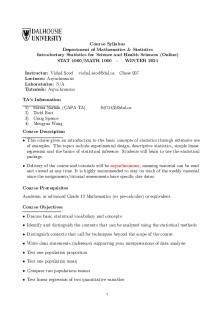
Syllabus STAT 1060 W2021
- 7 Pages
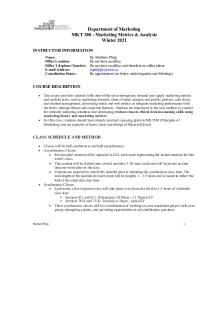
MKT300Course Outline W2021
- 11 Pages
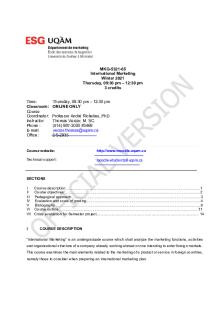
MKG5321 065 Course outline W2021
- 17 Pages
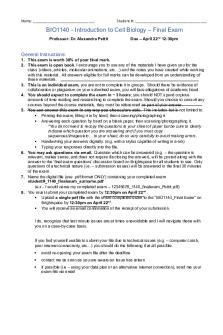
BIO1140 Final Exam W2021 Student
- 12 Pages
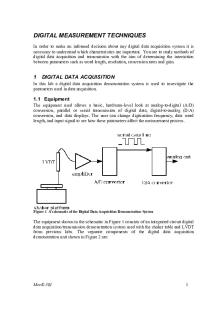
Mec E301 Lab02 Digital-W2021
- 9 Pages

Syllabus Syllabus Syllabus
- 4 Pages
Popular Institutions
- Tinajero National High School - Annex
- Politeknik Caltex Riau
- Yokohama City University
- SGT University
- University of Al-Qadisiyah
- Divine Word College of Vigan
- Techniek College Rotterdam
- Universidade de Santiago
- Universiti Teknologi MARA Cawangan Johor Kampus Pasir Gudang
- Poltekkes Kemenkes Yogyakarta
- Baguio City National High School
- Colegio san marcos
- preparatoria uno
- Centro de Bachillerato Tecnológico Industrial y de Servicios No. 107
- Dalian Maritime University
- Quang Trung Secondary School
- Colegio Tecnológico en Informática
- Corporación Regional de Educación Superior
- Grupo CEDVA
- Dar Al Uloom University
- Centro de Estudios Preuniversitarios de la Universidad Nacional de Ingeniería
- 上智大学
- Aakash International School, Nuna Majara
- San Felipe Neri Catholic School
- Kang Chiao International School - New Taipei City
- Misamis Occidental National High School
- Institución Educativa Escuela Normal Juan Ladrilleros
- Kolehiyo ng Pantukan
- Batanes State College
- Instituto Continental
- Sekolah Menengah Kejuruan Kesehatan Kaltara (Tarakan)
- Colegio de La Inmaculada Concepcion - Cebu






